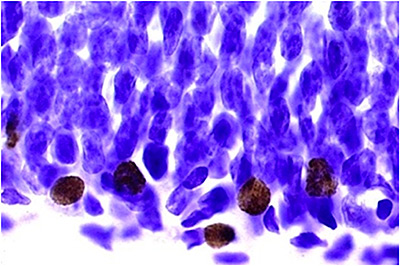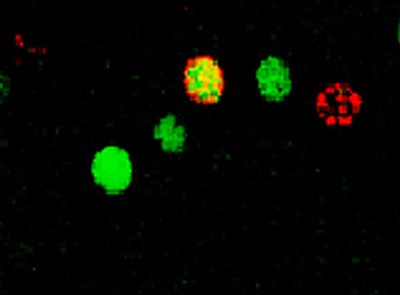Exercise reorganizes the brain to reduce stress and anxiety
July 5, 2013

A research team based at Princeton University found that physical activity reorganizes the brain so that its response to stress is reduced and anxiety is less likely to interfere with normal brain function. Running produced a large increase in the number of new neurons in the hippocampus — a brain region shown to regulate anxiety — of a mouse that ran for six weeks (above). The brown cells are new neurons, which are more numerous in active mice than sedentary mice, and the blue cells are mature neurons. (Credit: Gould laboratory)
Physical activity reorganizes the brain so that its response to stress is reduced and anxiety is less likely to interfere with normal brain function, according to a Princeton University research team.
The researchers report in the Journal of Neuroscience that when mice allowed to exercise regularly experienced a stressor — exposure to cold water — their brains exhibited a spike in the activity of neurons that shut off excitement in the ventral hippocampus, a brain region shown to regulate anxiety.
The impact of physical activity on the ventral hippocampus specifically has not been deeply explored, said senior author Elizabeth Gould, Princeton’s Dorman T. Warren Professor of Psychology. By doing so, members of Gould’s laboratory pinpointed brain cells and regions important to anxiety regulation that may help scientists better understand and treat human anxiety disorders, she said.
From an evolutionary standpoint, the research also shows that the brain can be extremely adaptive and tailor its own processes to an organism’s lifestyle or surroundings, Gould said. A higher likelihood of anxious behavior may have an adaptive advantage for less physically fit creatures. Anxiety often manifests itself in avoidant behavior and avoiding potentially dangerous situations would increase the likelihood of survival, particularly for those less capable of responding with a “fight or flight” reaction, she said.

The researchers found that running prevents the activation of new neurons in response to stress. In sedentary mice, stress activated new neurons in the hippocampus (red and green cell above), but after 6 weeks of running, the stress-induced activation of both new and mature neurons disappeared. The red cells are new neurons and the green cells are activated mature neurons. (Credit: Gould laboratory)
“Understanding how the brain regulates anxious behavior gives us potential clues about helping people with anxiety disorders. It also tells us something about how the brain modifies itself to respond optimally to its own environment,” said Gould, who also is a professor in the Princeton Neuroscience Institute.
This research was supported by National Institute of Mental Health.